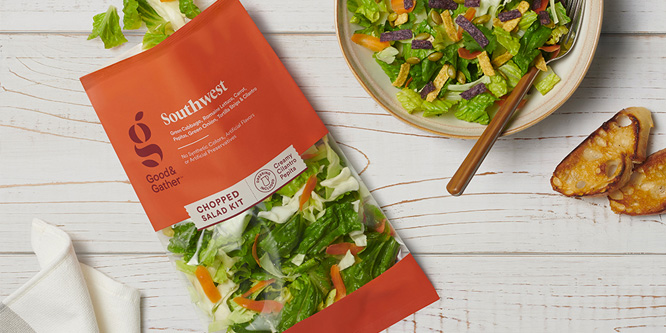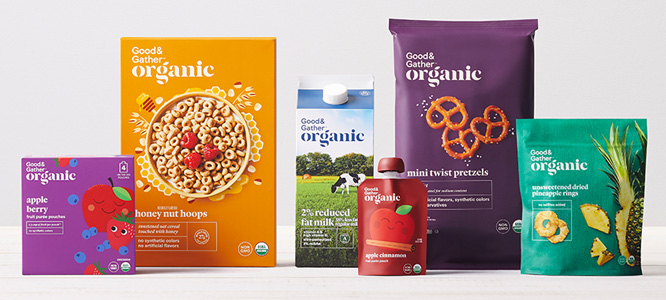
Photo: Target
Will a new grocery private label spur more Target runs?
Grocery, it is no secret, is among the key categories that Target has focused on since Brian Cornell became the retailer’s CEO in 2014. It is also no secret that the chain’s performance in grocery has been uneven during that time. Now, Target is taking another run at grocery success with the introduction of a new private label line that includes a wide variety of products that are free of artificial flavors, synthetic colors, artificial sweeteners and high fructose corn syrup.
Good & Gather, the name of the new label, will kick off with 650 new items landing in Target’s stores on Sept. 15. The line of staples, which will expand to more than 2,000 SKUs by the end of next year, will stretch from shelf-stable categories to the produce aisle and the dairy case.
“Our guests are incredibly busy and want great-tasting food they can feel good about feeding their families,” said Stephanie Lundquist, executive vice president, food & beverage, Target, in a statement.
Ms. Lundquist called the development of Good & Gather, Target’s “most ambitious food undertaking yet” as the retailer sought to create “convenient, affordable options that do not cut corners on quality or taste.”

Target’s goal is for the new line to become its “flagship” grocery brand. As the retailer adds more SKUs with the Good & Gather label it plans to phase out its Archer Farms and Simply Balanced private labels while reducing the number of Market Pantry items it sells.
Brian Yarbrough, an analyst at Edward Jones, told CNBC that, while Target has made gains in its grocery business in recent years, it still has a long way to go. Grocery sales, he pointed out, are more than 50 percent of Walmart’s business, while only about 20 percent of Target’s. A strong private label presence is a key strategy to draw consumers more willing than ever to try alternatives to the large national brands.
Discussion Questions
DISCUSSION QUESTIONS: How much progress do you think Target has made at improving its grocery business in recent years? Do you approve of the chain’s move to debut the Good & Gather line while phasing out the ArchersFarms and Simply Balanced labels and cutting back on Market Pantry?


While Target has made enormous progress over the past couple of years, grocery has been the one category it hasn’t reformed.
This new label is a major step forward that introduces excitement and interest to the food department. Good & Gather creates a more cohesive and compelling food offering as well as being a platform for the launch of some new and interesting lines which should entice consumers.
The positioning of the brand, which offers great taste and good value for money, is correct for Target. And the inclusion of sub-brands – such as organic, kids, premium and seasonal – within the Good & Gather family is smart as all of these components have tremendous growth potential. Target is now able to tackle these under one banner, which saves them from creating confusion with a raft of different brands and lines.
I believe this will help the company drive the next phase of its growth in the lucrative but highly competitive grocery market. In essence, it gives Target a near- and medium-term advantage over many other grocers which have significantly invested neither in own-label nor their stores.
Gregg Steinhafel (Brian Cornell’s predecessor as CEO) invested heavily in the grocery business, but it never gained traction and Mr. Cornell was right to turn Target’s attention back to its core businesses of apparel and home. Whether a new private label is a game-changer is hard to forecast — Target is still not a top-of-mind grocery retailer and it’s reflected in that 20 percent “penetration” number. But Target has had recent success revisiting (and in some cases replacing) its legacy private brands — certainly grocery deserves the same scrutiny.
Just another thought: Outside of the Super Targets, the grocery section never aspired to the breadth and scale of a Walmart store — which may explain its lack of success. But Aldi might have been a good role model for Target, if Aldi weren’t so busy expanding and grabbing market share on its own.
Target’s lackluster performance in grocery revenues won’t be solved by creating a new private label brand. One of the challenges Target has with its grocery offering is that they have seemed to rely on convenience grocery purchase. The size of Target’s grocery area and the breadth of the products offered is significantly less than Walmart’s and traditional grocery stores. We may pick up some bananas or milk at Target when we are purchasing other staple items, but it is not a destination for a longer grocery list.
Compared to Trader Joe’s, Costco and Kroger, Target has not been successful in creating a strong private label brand. It will take some time to know if Good & Gather can establish a loyal following.
I remember seeing the first SuperTargets back in the 1990s and thinking that it was clear the retailer got fashion merchandisers to design the grocery sections. Little consideration for how the shopper buys and mostly concentrating on how the retailer can sell. Not a winning strategy. They modified their plans dramatically, making them look more like traditional supermarkets while keeping some of the elements that made Target’s grocery merchandising distinctive (at least from Walmart’s…). They still haven’t gone far enough on the in-store marketing front, but have gotten dramatically better on assortment, particularly in store brands. I’m sure the data is telling them that Archers Farms and Simply Balanced aren’t doing the job and that’s why they’re on the way out. I hope they’ve learned a good lesson with them and don’t repeat it with the Good & Gather line.
Although Target is often associated with apparel and home decor, these moves prove Target is serious about prioritizing grocery as a strategic differentiator.
Target’s private label changes suggest consumers demand easier, more convenient and healthier food options than Archer Farms and Simply Balanced delivered.
Focusing on fast-moving grocery goods could encourage consumers to shop at Target more frequently. Investing in private label gives Target more control over the end products, margins and costs. Private label’s exclusivity means consumers can only buy these private brands from Target, which can boost sales and loyalty.
Developing new free-from and natural private label products can help Target shake up its assortment to stand out, resonate with shoppers and gain an edge.
First, I love what I will define as the brand promise for Good & Gather…”free of artificial flavors, synthetic colors, artificial sweeteners and high fructose corn syrup.” Wholesome food at a great value. Perfect. I will make it a point to try a few items just out of sheer consumer curiosity. Unfortunately, in my local Target the grocery section is a schlep from the front door. It’s at the back of the store behind apparel and personal care. It does not “feel” like a grocery store. Evolving content may change that perception over time, but for now I am married to my favorite purveyor of sourdough bread and fresh veggies.
Target has a strong reputation for successful private labels in the apparel and home goods product categories – grocery, not so much. Their Archer Farms and Simply Balanced brands yielded mixed results, but this is likely a casualty of Target’s haphazard approach to merchandising the grocery section. In my local Target, there are obvious visual differences between the apparel, home goods, and electronics sections as compared to grocery. Shelf-stable products and convenience items have fared better, leaving fresh produce, meats, etc. severely lacking in appeal. It’s interesting to note that this same Target store has just begun a massive remodel, so there are clearly changes to come in the grocery aisle. I expect previously announced enhancements with dual entries, separate focus on quick convenience shoppers and longer Target-run shopping visits may prove to be a better-differentiated strategy. This new Good & Gather brand is an example of that new focus on the grocery category and should be an indicator of good things to come from future Target remodels along with new products on the shelf.
The Good & Gather line, which offers affordable, organic, wholesome grocery products within the Target umbrella, will offer the brand another potential revenue stream. Target doesn’t typically come top-of-mind when it comes to grocery. However, the Target loyalists will be pleasantly surprised to have the organic food options while they are making their Target runs.
There is a significant long-term organic and packaged goods opportunity for Target, especially with the Millennial and Gen Z sects, who are fatigued with the high priced tags associated with healthy eating. It will be interesting to see how this plays out for the Target organization.
The first Super Target I saw featured a halved head of cabbage, drastically displayed and — as almost anyone but apparently Target could guess — rusting and rotting before my very eyes. Needless to say, Target has come a long way since then. But that said, progress has obviously not been what the management teams wrestling with the grocery problem had hoped for. The problem is, I think, less with the way Target handles food and more that it has not earned the right in the mind of consumers to be a viable alternative to wherever it is they currently buy their food. What gave Target an edge in non-foods was uniqueness, style, merchandising, and affordability. You couldn’t buy (the same) designer fashions or housewares anywhere but Target, but you can buy knock-off Honey Nut Cheerios everywhere. Inventory isn’t going to solve Target’s “food problem,” storytelling is. Target executives would be well served to go back and study how Dave Nichol went about building the President’s Choice brand at Loblaw. It’s a good story about the power of telling a good story.
Slow news Monday? Well no matter. There is nothing — and I mean nothing — here that says to me “increased market share.” They’re dumping a pair of private labels in favor or a new one. Why? (And even if there’s a reason, I hate the name.)
Target grocery doesn’t do as well as hoped for a number of logistic reasons — the food section is often too far from the front, the stores are often far from residential areas and there are too few of them (Walmart overcomes similar issues by overwhelming volume), not a single one of which is improved by this move.
Target should be asking the question, what happens to the rest of the store if they stop selling groceries? My guess is either the decline of in-store sales is negligible or they can put the space to better (more profitable) use. They aren’t going to have the price, the variety, or the interesting selection that makes other chains viable. Maybe they should just give it up. Or, given how much data they must have on their guests, figure out what staple foods are commonly bought and feature that as a small store section.
Refreshing and improving on tired and ineffective private label brands is always a good idea. It’s a step in the right direction.
Creating a brand and products only found in Target’s grocery aisles will create a destination for customers — assuming the brands and products are from good to excellent. Target will always draw traffic to its stores, it just needs to give customers a reason to look into the grocery area.
Part of Target’s challenge is in educating the consumer relative to non national brand offerings. The more these new private label offerings enter the market, the more the pressure is on Target to convince the market of its differential advantage. Archer Farms had a fairly good perception and consumer following. Surprised to learn of its planned demise.